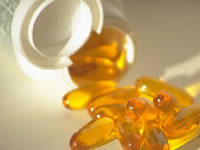Scientists still are unsure how much daily vitamin E is best. The committee that created the latest federal government's Dietary Guidelines for Americans says that many adults and children in the U.S. may not consume optimum amounts of vitamin E. Although symptoms of a vitamin E deficiency are not seen, dietary surveys often show that people consume less than the Recommended Dietary Allowance (RDA).
Yet the panel that established the most recent RDAs states that the public's average intake is probably above the RDA for this vitamin. One reason is that the food composition tables used to determine vitamin E consumption are incomplete. Another reason is that people often underestimate the amount of fats and oils they eat, which are major sources of this vitamin.
The RDA for vitamin E for all adults is 15 milligrams (mg). Vegetable oils are the major sources. A tablespoon of canola oil supplies 2.4 mg, while a tablespoon of olive oil has 1.9 mg. Almonds are the most concentrated nut source, with 13.5 mg in a one-third cup serving. Peanuts have 2.44 mg in the same portion. Ready-to-eat fortified cereals provide from 7 to 17 mg. Lesser sources include a half-cup of cooked dark leafy green vegetables, which delivers 2 mg.
Because many of the foods with vitamin E are concentrated in calories, it's hard to meet the RDA for this vitamin if you're trying to cut calories. For example, the lowfat DASH diet, which is a highly recommended mostly plant-based eating style, provides only about 11 to 12 mg of vitamin E, unless you make specific food choices to raise the amount.
Vitamin E is important because it is an antioxidant. It decreases the oxidation of LDL cholesterol to keep it in a less damaging form. Vitamin E also protects the heart by decreasing the tendency of blood cells to clot and stick to blood vessel walls. It may help prevent cancer by neutralizing substances called free radicals that damage cells' DNA. It could also stop cancer cells from developing the blood supply they need to grow and spread.
Content Continues Below ⤵ ↷
Although taking supplements and eating fortified foods that give you 1,000 International Units (IU) are clearly unsafe because they increase the risk of hemorrhage, it is unclear whether you should try to go beyond the RDA of 15 mg (about 22 to 33 IU) for this vitamin.
The HOPE and HOPE-TOO trials followed people taking 400 IU vitamin E supplements for an average of 4.5 and 7 years. Their blood levels of vitamin E increased dramatically, but there was no difference in cancer incidence, cancer deaths, heart attack, or stroke between the this group of people and another group in the study which took no vitamin E supplements. However, the group taking vitamin E was 21 percent more likely to be hospitalized for heart failure. A recent review of 19 studies of vitamin E supplementation also noted that most studies of people using doses of 400 IU or more found slight increases in overall death rates. Lower doses such as the 30 IU found in multivitamins did not show such dangers.
Although another recent review discovered that six out of seven large randomized trials indicate that vitamin E supplements have no effect on heart attack, stroke, or heart-related death, there may be a health difference between vitamin E supplements and the vitamin's natural form. Most supplements contain � and thus most research looks at � the form of vitamin E known as alpha-tocopherol. However, gamma-tocopherol is actually the major form in the American diet. This is the kind that is high in walnuts, peanuts and pecans, as well as corn and soy oils. Some studies show that blood levels of gamma-tocopherol are a good or better indicator of heart and cancer risk. Gamma-tocopherol may even have unique cancer-suppressing functions within cells. Some studies suggest that alpha-tocopherol supplements may have the undesirable effect of reducing blood and tissue levels of gamma-tocopherol.
AICR
